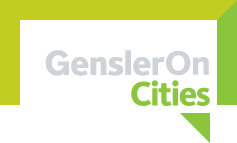Gensler @ AUCCCD: Catalyzing Well-being, Resilience, and Innovation on the Academic Campus
Gensler's New York office. Image © Gensler
A recent survey conducted by the American Psychological Association (APA) revealed an alarming trend in the number of students seeking help for serious mental health problems at campus counseling centers. As designers in higher-education, we’re hearing a similar concern across the higher-ed community. In fact, mental health was the number one aspect of student well-being brought up repeatedly as part of last year’s Dialogues with Gensler series on Well-being on the Academic Campus.
Gensler Chicago was recently invited to present at the AUCCCD Conference, a national conference held each year as a forum and resource for counseling directors on academic campuses. A small subset of the broader academic community, counseling directors have a significant impact on the student experience. Pitched as an upbeat hiatus at a conference that focuses on the more sobering aspects of student mental health, Gensler’s Pecha Kucha style presentation on six broad topics challenged the audience to think more widely about their roles relative to the student experience. The feedback we received underscored the broad reach counseling center leaders have on their campuses.
Presenting on "Failure & Innovation," Lindsey Feola addressed the growing trend on campuses towards innovation and the critical role that failure plays in the process. Yet, fear of failure in so many of today’s students leads to inaction, and failure as a process of learning is not well supported on the academic campus. From a student mental health perspective, academia’s lack of effort in promoting failure as a positive and necessary aspect of learning has led to debilitating (and sadly, sometimes fatal) results.
Just as successful innovation relies on a flipped perspective towards failure, in many ways, the future of education depends on a ‘reset’ around the culture of learning. My presentation on ‘Future of Education’ focused on the theme of engagement and how it might help designers to rethink learning environments. Although engagement is not a new idea, even some of the most cutting-edge, high-tech learning spaces can fail to engage learners. Furthermore, studies have begun to connect engagement with student performance, prompting a laser focus across academia to produce engaged learners in order to improve student success.
As metrics surrounding student performance continue to pervade academic culture, leaders and administrators are searching for effective ways to harness data. Presenting on ‘Big Data & Design,’ Melissa Mayer addressed the importance of smart data vs. big data in that raw information is only as useful as the method for analyzing and applying it. Like many of their leadership counterparts, counseling center directors are often faced with the responsibility to answer to statistics tied to student well-being, and the ability and resources that can be devoted to interpreting massive amounts of information vary highly across institutions.
Brian Vitale and Michael Townsend both touched on this intersection of the quantitative and qualitative in their presentations on ‘Chicago as Campus’ and ‘Urban Resilience.’ In its Downtown Loop alone, Chicago’s higher-education institutions educate over 58,000 students daily, making it one of the largest college towns in the US. Yet, the student community is largely invisible, and its support structures are few and far between. While Brian identified aspects of this unique urban campus that make it viable – including diversity in institutions, neighborhood compatibility, and flexibility, Michael stressed the importance of the linkages and fabric that make this type of urban environment sustainable and resilient: leadership & communication; connectivity & transportation; and learning & systems.
Creating a thriving community around well-being is one of the most fundamental challenges that counseling center directors face. Rod Vickroy’s presentation on ‘Well-being & Design’ identified ways that the design of space can encourage students to participate more proactively in their own well-being. Often these universal design principles are most successful when they aren’t necessarily overt; rather they ‘nudge’ students to make choices on a regular basis towards a healthier lifestyle. For counseling centers that often see students only when they’ve reached rock bottom, this overlay for campus design can be crucial.
Our team was honored for the opportunity to engage with this group of campus leaders, and it brought to light many unexplored and unexpected connections between the big picture, strategic ideas in the presentations and the everyday aspects of campus life that counseling directors must address with their students regularly.
The 20x20 Pecha Kucha format entitled Catalyzing Wellness, Resilience, and Innovation on the Academic Campus included the following presentations, all done by Gensler Chicago staff: (1) Future of Education (Meghan Webster), (2) Well-being & Design (Rod Vickroy), (3) Innovation & Failure (Lindsey Feola), (4) Chicago as Campus (Brian Vitale), (5) Urban Resilience (Michael Townsend), and (6) Big Data & Design (Melissa Mayer). We invite you to take a look at the slide deck and leave your comments below.
888 Brannan Street, San Francisco, Calif. Image © Gensler
 |
Meghan is a senior associate in Gensler's Chicago office. She has a broad range of experience across the country and overseas in every phase of the architecture and construction process, and she draws on this experience when thinking about new and inventive ways for buildings to broaden the lives of the end-users. Contact her at meghan_webster@gensler.com. |

 Meghan Webster
Meghan Webster


Reader Comments